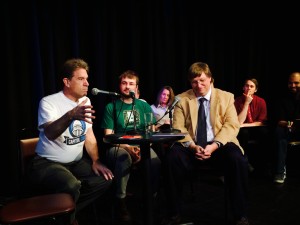On July 14th, MNCOGI sent the following letter to Minneapolis City Council Member Andrew Johnson concerning the then draft Open Data Policy. This letter served as both a show of support for the issue of open data in Minneapolis, and a set of recommended changes to the draft policy in order to better align the Open Data Policy with the Minnesota Data Practices Act and federal data laws.
On July 30th, the Minneapolis City Council adopted an amended version of this Open Data Policy.
The following letter is also available for download as a PDF.
Gary Hill
Board Chair
Minnesota Coalition on Government Information
July 14th, 2014
Council Member Andrew Johnson
350 South 5th Street
Room 307
Minneapolis, MN 55415
Dear Council Member Johnson,
I am writing to you on behalf of the Minnesota Coalition on Government Information (MNCOGI), a non-profit organization dedicated to government transparency and public access to information. Our members support the aims and intentions of the city’s proposed “Open Data” policy, and we wish Minneapolis success in moving ahead with its initiative.
Bill Bushey (a MNCOGI board member who has been closely involved in discussions regarding the proposed policy) has shared a draft with our members for the purposes of gathering feedback. MNCOGI has evaluated the draft, and offers the following general comments:
1. Overall, we would urge that the draft language be modified in certain places to more closely align with terminology used in Chapter 13 of the Minnesota Statutes. This should be done in order to avoid any interpretive issues related to the implementation of the Open Data Policy within the general framework of the Data Practices Act.
For instance, the language within the “Department Responsibilities” section that describes “private” data should be modified to conform to the terminology of Chapter 13. Instead of labeling such data as simply “private,” it should be labeled as either “not public” data, or alternately, “private data on individuals, nonpublic data, or protected nonpublic data.” Please also note that “administrative cost concerns” are not permissible reasons to make data “not public” under Chapter 13.
2. We would also urge that the Open Data Policy clearly articulate the role of the Data Practices Responsible Authority (RA) within the work-flow structure of the Open Data initiative, due to the RA’s key role in administering data access under Chapter 13. In MNCOGI’s opinion, all city personnel responsible for implementing the Open Data Policy should be under the purview of the RA.
3. Finally, we would urge the city to evaluate potential liability issues related to unintentional disclosures of data classified as “not public” under state or federal law. This would be a “best practices” step that would be worth undertaking, given the potential scale of the data releases that the city would be making. Data policies like this one are cutting-edge projects, and MNCOGI wishes to see them crafted in concert with all applicable statutory requirements, so that they may become models for similar, future activities.
Please feel free to contact us with any additional follow-up questions. We appreciate your efforts to move the concept of government transparency into this new and innovative era.
Sincerely,
/s/ Gary Hill
Gary Hill
Board Chair, MNCOGI

